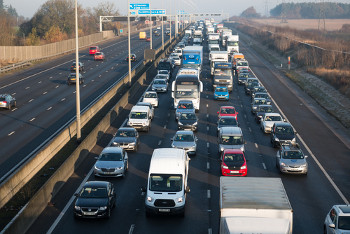The Government has launched a call for evidence on the possible introduction of Automated Lane Keeping System (ALKS) on UK motorways.
It follows the adoption by 60 countries, including the UK, of a new regulation on ALKS – the first binding international regulation on 'level 3' vehicle automation – which will come into force in January 2021.

The DfT described ALKS as 'a traffic jam chauffeur technology'
Officials said the technology is likely to be available in cars entering the UK market from Spring 2021.
Transport minister Rachel Maclean said: ‘Automated technology could make driving safer, smoother and easier for motorists and the UK should be the first country to see these benefits, attracting manufacturers to develop and test new technologies.
‘The UK’s work in this area is world leading and the results from this call for evidence could be a significant step forward for this exciting technology.’
Mike Hawes, chief executive of the Society of Motor Manufacturers and Traders, said: ‘Automated technologies for vehicles, of which automated lane keeping is the latest, will be life-changing, making our journeys safer and smoother than ever before and helping prevent some 47,000 serious accidents and save 3,900 lives over the next decade.
‘This advanced technology is ready for roll out in new models from as early as 2021, so today’s announcement is a welcome step in preparing the UK for its use.’
The Department for Transport (DfT) said ALKS is designed to enable drivers – for the first time ever – to delegate the task of driving to the vehicle, although the driver must be ready and able to resume driving control when prompted by the vehicle.
The consulation describes ALKS as 'a traffic jam chauffeur technology' designed to control the lateral and longitudinal movement of the vehicle for an extended period without further driver command.
'At such times, the system is in primary control of the vehicle, and performs the driving task instead of the driver, at low speeds on motorways'.
The DfT said it is seeking views from industry on the role of the driver and proposed rules on the use of this system to pave the way for its safe use in Great Britain, within the current legal framework.
Specifically it is seeking views to understand if ALKS technology is compliant with the definition of automation under the Automated and Electric Vehicles Act 2018, which requires that the vehicle be capable of safely and lawfully driving itself without being controlled and without needing to be monitored, when in automated mode.
The call for evidence will ask whether vehicles using this technology should be legally defined as an automated vehicle, which would mean the technology provider would be responsible for the safety of the vehicle when the system is engaged, rather than the driver.
In its current form, the new regulation limits the operational speed of ALKS systems to a maximum of 60km/h. However, the call for evidence seeks views on government proposals to allow its use on British roads at speeds of up to 70mph (113km/h).
The DfT said it plans to launch a public consultation in late 2020 on the detail of any changes to legislation and The Highway Code that are proposed, which will include a summary of responses to this call for evidence.
Register now for full access
Register just once to get unrestricted, real-time coverage of the issues and challenges facing UK transport and highways engineers.
Full website content includes the latest news, exclusive commentary from leading industry figures and detailed topical analysis of the highways, transportation, environment and place-shaping sectors.
Use the link below to register your details for full, free access.
Already a registered? Login